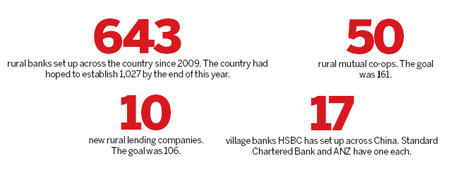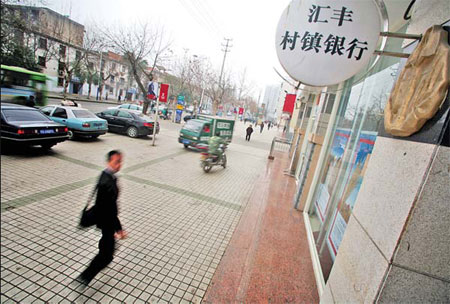Rural banks lend hand to farmers
Updated: 2011-12-07 09:12
By Wang Xiaotian (China Daily)
|
|||||||||||
|
Here comes the money: This farmer got the first loan from a village bank in Guangan, Sichuan province, after it opened last Dec 18. Rural banks have helped support small-business owners and farmers in underserved areas. [Photo / China Daily] |
|
HSBC has 17 village banks across China. This one, in Suizhou, Hubei province, opened in 2007. [Photo /?China Daily] |

Less-developed areas offer huge opportunities for small lenders, Wang Xiaotian reports from Hubei, Chongqing and Shandong.
When Hu Jizheng wanted to upgrade the facilities on his pig farm, he decided to do something unique.
Get a loan from a bank.
"In the past we used to borrow from relatives and friends," said the 48-year-old, who is raising more than 4,000 pigs on his farm in Hubei province.
A rural bank nearby, however, was offering money at an interest rate of 8.6 percent - less than he would pay elsewhere. So in April he borrowed 2 million yuan ($314,000) and expects the revamping of his equipment and purchase of a methane tank will bring his annual revenue to more than 15 million yuan.
"I never imagined a bank could lend me so much money at such a cheap rate."
He had earlier visited all traditional major lenders in the area. They all rejected him.
"To my surprise, unlike common banks, the working style of this rural bank is surprisingly good," Hu said. "Surely it's time for me to change my outlook and turn to rural banks for capital instead of private lenders."
In underdeveloped areas of China, rural banks are gaining momentum as a supplement to major lenders and a lifesaver to small-business owners, farmers and other individuals. This has proved especially useful since the central government started tightening its monetary stance and credit control at the end of last year.
"The biggest advantage of rural banks is that they are fully independent, which means high efficiency in decision-making and more flexibility in product development," said Bai Shan, head of banking for the Shandong provincial government. Some rural banks can lend out money in three working days, Bai said.
Pushing things along
The China Banking Regulatory Commission set out two years ago to improve financial services in rural areas. It's goal: to establish 1,294 rural financial institutions across the country by the end of this year - 1,027 rural banks, 106 lending companies and 161 rural mutual cooperatives. So far, 643 rural banks have been set up, 10 lending companies and 50 co-ops.
Rural banks are fully independent banks but usually operate under a lender's name.
While the commission encouraged banks' quick expansion in rural areas, the regulatory bureaus at provincial level were more cautious when approving local banks. Most of the bureaus required the initiating lender to hold more than 51 percent of the shares in the new rural banks, and some set higher criteria on the banks' locations.
In addition, requirements and approval standards set by local governments varied widely, said Xu Jipian, chief finance officer for Bank of China's Fullerton Community Bank (BFCB). That disparity complicated rapid development.
To remove barriers from provincial governments, the commission issued an update on July 25. It reclaimed the approval authority from local banking regulatory bureaus and indicated it would encourage lenders, especially big commercial banks, to set up rural banks on a large scale.
"The measure will accelerate the expansion pace of rural banks, especially those backed by major State-owned lenders, by reducing operation and management costs," said Chelang Shu, who directs business development for BFCB. That bank is a joint venture set up by Bank of China and Fullerton Financial Holdings, a subsidiary of Singapore's sovereign wealth fund Temasek Holding.
Shu said local governments are not completely confident in the rural banks because they cannot receive direct capital injection from big lenders, and if they go bankrupt, the burden will fall on the local government.
However, better-than-expected performance by rural banks consolidated the resolve of the central regulator and major lenders to develop their network in rural areas.
A good start
The first bank under the flag of BFCB, set in Qichun, farmer Hu's county, opened in March and registered a profit in August, 13 months earlier than expected. It provided nearly 25.4 million yuan in loans at interest rates averaging 40 percent higher than the benchmark lending rates, which is now 6.56 percent.
Sichuan-based Dayi Bocom Xingmin Rural Bank is the first rural bank in China with a controlling State-owned shareholder, Bank of Communications. It realized a profit of more than 5 million yuan in 2010, two years after its establishment in September 2008.
And the rural bank opened by Australia and New Zealand Banking Group (ANZ) in Chongqing in 2009 moved into the black in the second half of this year, said Gilles Plante, ANZ China chairman and ANZ CEO for Northeast Asia, Europe and America.
The competition
Tightening monetary policies have also helped the development of rural banking, said Xu of BFCB. "Since larger banks are lending less, clients are now turning to smaller banks."
Even so, more than one-third of the rural banks in China operate at a loss, a commission official said. However, by the end of 2010, nearly 70 percent of the new rural financial institutions realized a profit, said Yin Youxiang, a regulator with the commission.
"Emerging rural financial institutions such as rural banks are just in their take-off phase and only play a role in activating the local market, judging by the current situation," said Mao Hongjun, deputy director of the commission's cooperative finance supervision department. "Despite the rapid growth, they are still too weak to compete with rural credit cooperatives, which dominate the rural market at present."
Outstanding loans at rural banks in Shandong stand at about 8 billion yuan, compared with more than 580 billion yuan lent by local rural credit cooperatives, she said.
But the cooperatives are feeling the competition as rural banks and lending companies head for the underdeveloped regions.
In towns across Shandong, where rural banks compete most directly with rural credit cooperatives, the latter's market share is about 20 percent. That compares with the 50-60 percent market share in remote villages, said Song Wenxuan, director of the Shandong Rural Credit Union.
Foreign interest
Andrew Au, CEO of Citigroup China and chairman of Citibank (China), said access to credit is the most pressing financial need in many parts of China that are underserved by financial institutions. Financial services for deposits in those areas are already very mature.
Unlike its foreign counterparts, such as HSBC Bank and Standard Chartered, Citi China chose to be a lending company. It inaugurated its fourth lending company in a district adjacent to rural areas of Chong-qing in September.
In contrast to rural banks, lending companies in China do not take deposits although they do lend to individuals.
"It is still too early to make a judgment on which model is the best for the market," Au said.
Foreign banks have extended their rural networks in China, although more cautiously than some Chinese counterparts, since 2006. That's when the banking regulatory commission published guidelines to encourage banks to set up financial institutions in underdeveloped areas.
HSBC has set up 17 village banks across the country. Standard Chartered Bank has one, in Inner Mongolia, and ANZ has one, in Chongqing's Liangping county.
Additional risks
Ye Yunyan, a banking analyst at China Galaxy Securities, said the most important factor for financial institutions in rural areas is risk control. They must deal with financial demand that is much more scattered and irregular than in urban areas, with lack of collateral and with higher maintenance costs.
Some basic external operating systems are still not available in rural markets, which affects daily operation and management of rural banks, said a Chongqing banking regulator who declined to be named.
And most rural banks lack easy access to the central bank's settlement system. "That severely restricts their operations, especially in absorbing deposits," the official said.
Seeing the potential
Still, some lenders are optimistic. "The rural market in China is not necessarily high- risk," Citi's Au said. "I think it is a market with reasonable risk and reasonable return, based on our experience."
"China's rural communities are developing into larger towns, which presents huge growth potential and business opportunities," said Dang Pengjun, deputy head of strategic development at Bank of China. He said the bank aims to establish 400 rural banks nationwide in the next five years.
Rural banks play a very important role in financially supporting small and medium-sized enterprises (SMEs) and should be encouraged, said Zhou Dewen, chairman of the Wenzhou SMEs Development Association.
But the biggest obstacle to their rapid development, he said, still lies in that fact that private capital cannot initiate a rural bank directly.
"It's time to remove the threshold for private capital and implement some tax cut or subsidies for rural banks to let them better serve agriculture and SMEs without over-tight restrictions."
Li Xiang contributed to this report.










